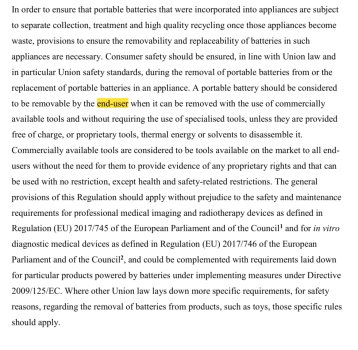Thats providing a requirement to rent and not purchase
View attachment 2250760
As you can see here it would be quite hard to do that. Considering the price need to be reasonable for said replacement part.
Nothing in that requires a low cost, just a reasonable cost for a battery, nor an easily copyable design. You could, for example, make the battery part of the back plate and require replacement of the entire back, making copying and matching colors difficult while making a case for a higher cost for the battery. It also doesn’t prevent serialization as long as the phone still works. Apple or others could still warn it’s not an OEM part and refuse trade-ins on that basis. Of course, you’d simply save the old one to drop in then, and as long as the device powers on you could trade it in.
And a portable battery needs to replaceable by common tools unless Apple decides to give them free of charge. And the ability to replace the battery with another compatible battery without affecting its functionality or performanEnce.
The questions are: “Is the economic operator responsible for providing any specialized tools or the original device manufacturer?” and “if a manufacturer offers the tools for sale to anyone does that make them ‘commercially available?’”
As much as I like the idea of a replaceable battery as long as it doesn’t impede the water / dust resistance I can see where manufacturers can be compliant without a return to the old pop off the cover and drop in new battery days.
The return rule is interesting - in the text you provided you’d only need to put a return at a company store or from an authorized reseller, and only take back your own batteries, not 3rd party. I suspect most companies will simply contract with a 3rd party to handle recycling to keep things simple and not have to make consumers sort batteries by manufacturer.
Here’s a scenario:
The entire back plate is the battery. It has a gasketed contact with the device to provide power, and the device back is solid to prevent dust and water intrusion. It snaps into place into a gasketed fiting, and can be removed with a small putty knofe or a cheap tool the manufacturer sells cheaply. That would meet the reg but even a reasonable price might be a 100 euros given the design. Unless knockoffs are colour matched they are likely to be less popular, plus the anticipated demand for a battery that only fits one year’s model is likely not to be very economically viable to knockoff.
I simply think this will not be the panacea many people seem to think it will be becasue manufacturers have lots of wiggle room in how it is implemented. I’m not claiming any company will do what I postulated, just that there are ways to make cheap competitors far less likely.




